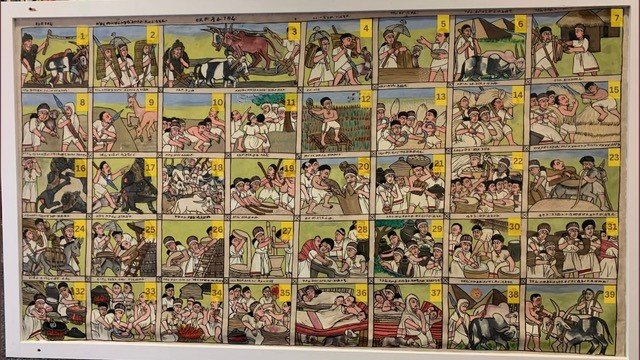Harvest Rituals: A Call for Visitation
FWF I PEEK project
led by Anette Baldauf, Institute for Art Theory and Cultural Studies
Duration: 1.7.2025 – 30.6.2027
This artistic research project explores harvest traditions from (East) Africa and examines them as sources of knowledge for practices of care, reciprocity, and relationship-building. It understands harvesting not only as a festive ritual but also as a method and a form of world-making— an embodied and relational practice that makes visible alternative ways of knowing and living together.
The project finds its starting point in harvest rituals from Ethiopia, Kenya, Tanzania, and Romania, as well as a dialogue with translocal African communities in Vienna. The project proposes to view harvesting as an artistic research practice that transcends cultural, geographical, and epistemic boundaries. In doing so, it uses harvesting as a decolonial framework that opens access to alternative knowledge systems — systems often excluded from Western-dominated research traditions.
Although Africa has been deeply affected by colonial and postcolonial exploitation, many debates around extractivism tend to focus on other regions, such as Latin America. African epistemologies are rarely considered in these analyses. This project challenges that condition: it shows that harvest rituals are grounded in deeply rooted principles of reciprocity, care, hospitality, and interconnectedness. They contribute to collective survival and embody a form of resilience that has been passed down through generations.
At the heart of the project is an artistic research engagement with these rituals. Performative methods such as scores, games, and communal gatherings are used, all oriented around the cyclical rhythms of harvesting — for example, calling, weaving, carrying, or returning. These practices serve as cultural references and living methods through which knowledge can be expressed in other ways — bodily, gesturally, orally, and materially.
The project proposes "visitation" — the attempt of creating and opening up for encounter to take place — as a foundational research ethos. It understands visiting as a method of nurturing relationships, remembering the past, honoring the present, and enabling the future. Time is experienced not as linear, but as circular and polyphonic — through memory, ritual, and spiritual connection.
By activating harvesting as an artistic-political strategy, the project shifts focus to East Africa — not as a geographic location but as a way of thinking and living that emphasizes connection, care, and collective knowledge. It invites us to rethink artistic research — not through strategies of appropriation, but participation, attentiveness, and return.
